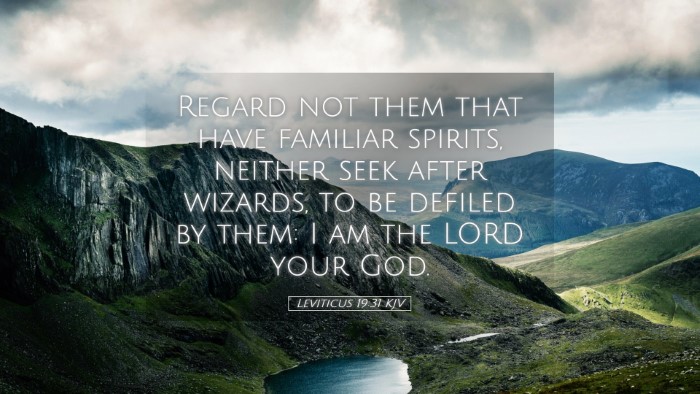Commentary on Leviticus 19:31
Verse: "Do not turn to mediums or necromancers; do not seek them out, and so make yourselves unclean by them: I am the LORD your God." (Leviticus 19:31, ESV)
Introduction
This verse is a critical part of the Holiness Code found in Leviticus, a section of scripture that outlines how the Israelites were to live in a way that reflected their covenant relationship with God. In Leviticus 19:31, we encounter a prohibition against consulting mediums and necromancers, reflecting God's desire for His people to maintain purity, focusing instead on obedience to His commandments.
Historical Context
The Book of Leviticus primarily deals with the priestly code and regulations concerning the worship and service of Yahweh. Chapters 17-26 comprise the Holiness Code, which emphasizes holiness as a way of life. The Israelites were surrounded by pagan practices that included divination, spiritism, and practices of the occult. The prohibition against these practices serves to distinguish the Israelites from their neighbors and underline the unique identity bestowed on them by God.
Interpretations from Public Domain Commentaries
Matthew Henry's Commentary
According to Matthew Henry, the prohibition against mediums and necromancers arises from God's character as the sovereign Lord. He emphasizes that such practices are not only sinful but also a direct affront to the Lord's authority. To engage in these practices is to seek knowledge or insight that should only be sought from God Himself. Henry notes that these forms of divination create a barrier between individuals and God, leading to impurity.
Albert Barnes' Notes on the Bible
Barnes provides a thorough analysis of the terms used in the verse. He points out that "mediums" refers to individuals who communicate with the dead while "necromancers" invokes the idea of those who claim to summon spirits. Both practices are viewed as abominations in the sight of God. Barnes argues that the essence of this command is to discourage any form of spiritual dependency on anything but God. By turning to such sources, individuals defile themselves and stray from God’s prescribed path.
Adam Clarke's Commentary
Adam Clarke further develops the theme of spiritual purity, explaining that the underlying principle of this command is to foster a complete trust and reliance on God. He emphasizes that consulting with mediums and necromancers reflects a lack of faith, as these practices lead individuals away from seeking divine wisdom. Clarke points out the historical significance of these practitioners in Canaanite societies and warns against the seduction of their supposed power.
Theological Implications
The prohibition against necromancy and consulting mediums has significant theological implications for understanding God’s nature and our relationship with Him. The emphasis on purity highlights that God is holy, and His followers are expected to reflect this holiness in their worship and daily lives. Engaging in practices contrary to God’s laws compromises one’s spiritual integrity and leads to alienation from the community of faith.
Practical Applications
The message of Leviticus 19:31 remains relevant today, as the temptation to seek guidance from sources outside of God's will persists in modern society. Pastors and spiritual leaders can draw parallels between ancient and contemporary forms of divination, such as astrology, fortune-telling, and the occult, all of which can distract believers from their reliance on God. The emphasis on purity calls Christians to examine their own hearts and practices to ensure they seek wisdom from God alone.
Conclusion
In closing, Leviticus 19:31 reminds the people of God of the importance of spiritual integrity and the necessity of relying solely on Him for guidance and direction. The insights provided by commentaries from Matthew Henry, Albert Barnes, and Adam Clarke help illuminate the deeper meanings of this verse, grounding its significance in the historical, theological, and practical contexts of both the ancient Israelites and present-day believers. Through a commitment to holiness, Christians are invited to trust in the Lord without reservation while avoiding the allure of practices that compromise their faith.


